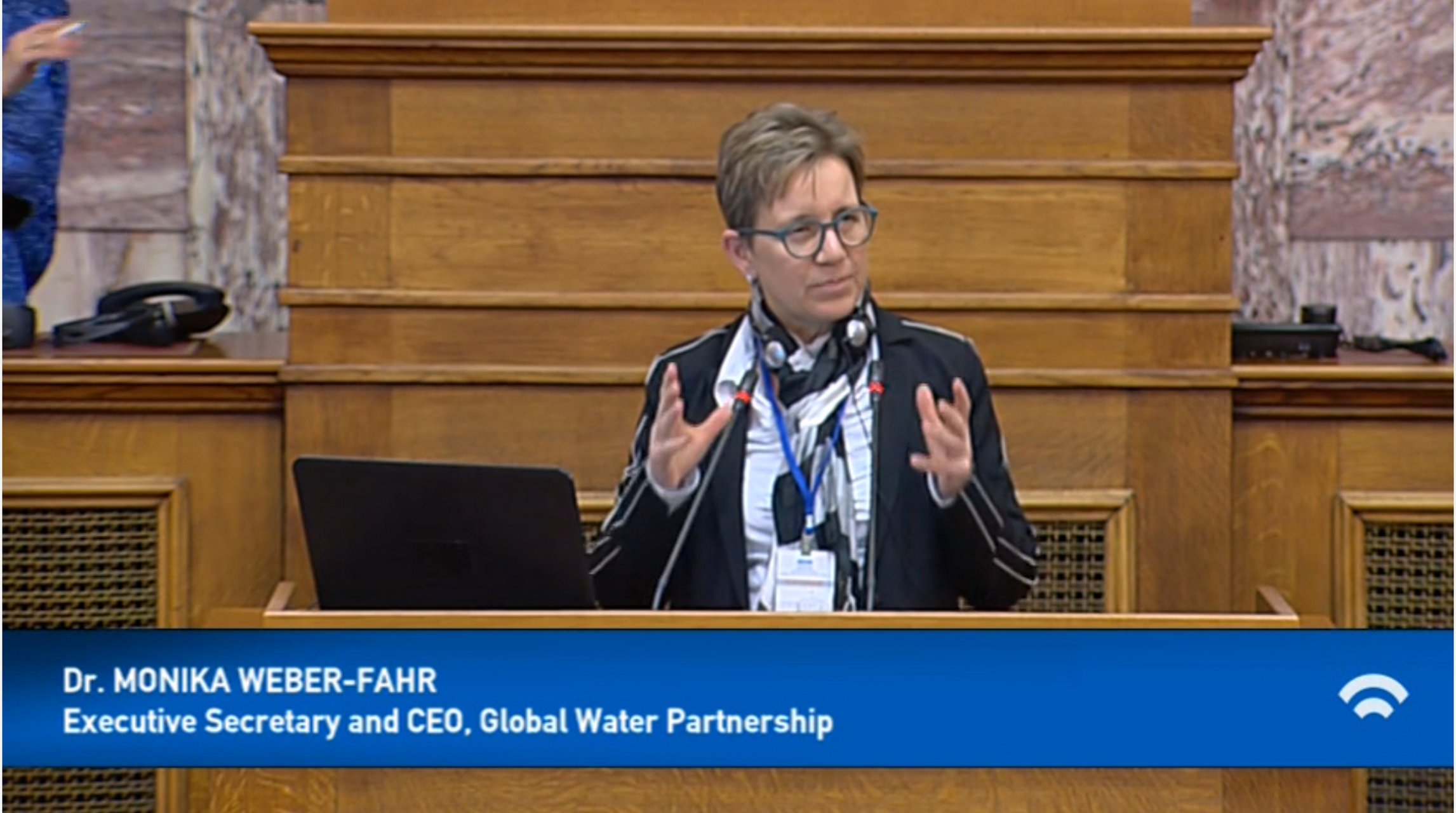Addressing the Hellenic Parliament on the invitation of Dr. Dionysia Avgerinopoulou, Chair of the Special Permanent Parliamentary Committee on Environmental Protection, Dr Weber-Fahr analyzed global water security risks, as well as solutions to address them as outlined in the new GWP Strategy 2020-2025, in a speech which was broadcast on Greek National Television.
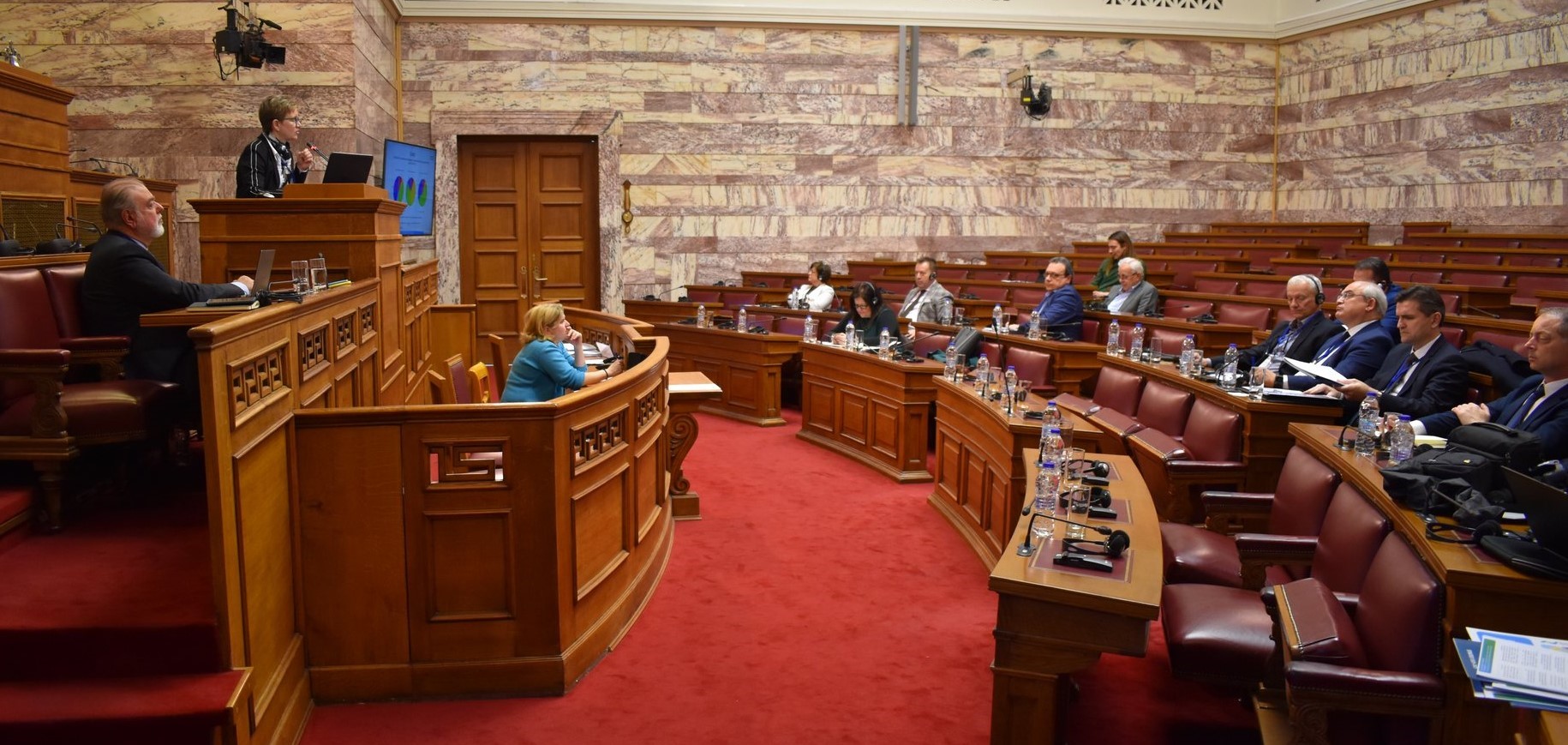 GWP-Med Executive Secretary during her address to the Hellenic Parliament. Her presentation and ensuing discussion with Parliamentarians were broadcast on National Greek Television.
GWP-Med Executive Secretary during her address to the Hellenic Parliament. Her presentation and ensuing discussion with Parliamentarians were broadcast on National Greek Television.
In her presentation, which was attended by the members of the Special Permanent Parliamentary Sub-Committee on Water Resources, as well as high-level representatives of Public Authorities and the Greek National Water Services Corporation (EYDAP), Dr Weber-Fahr emphasized the importance of engaging all relevant stakeholders and displaying the leadership necessary in order to address complex water management challenges proactively. She particularly elaborated on the central role of water in achieving the Sustainable Development Goals.
“Global and regional challenges to water security need to be addressed proactively, rather than only in times of water stress emergencies. It takes strong leadership to promote effective water management, by engaging all stakeholders and coming up with solutions that take into account all the interlinkages of water use. Greece, as a Member State of the European Union as well as the Union for the Mediterranean and a Contracting Party to the Barcelona Convention, can play a leadership role in promoting water security, and hence economic growth and stability in the region”, Dr. Weber-Fahr noted.
In her introductory remarks as Chair of the Committee, Dr. Avgerinopoulou emphasized that GWP has an important role to play in improving the quality of life and water security in societies all over the world. She noted that GWP has helped Greek and Mediterranean Parliamentarians gain valuable experience through their engagement in the Circle of Mediterranean Parliamentarians for Sustainable Development (COMPSUD)[1] .
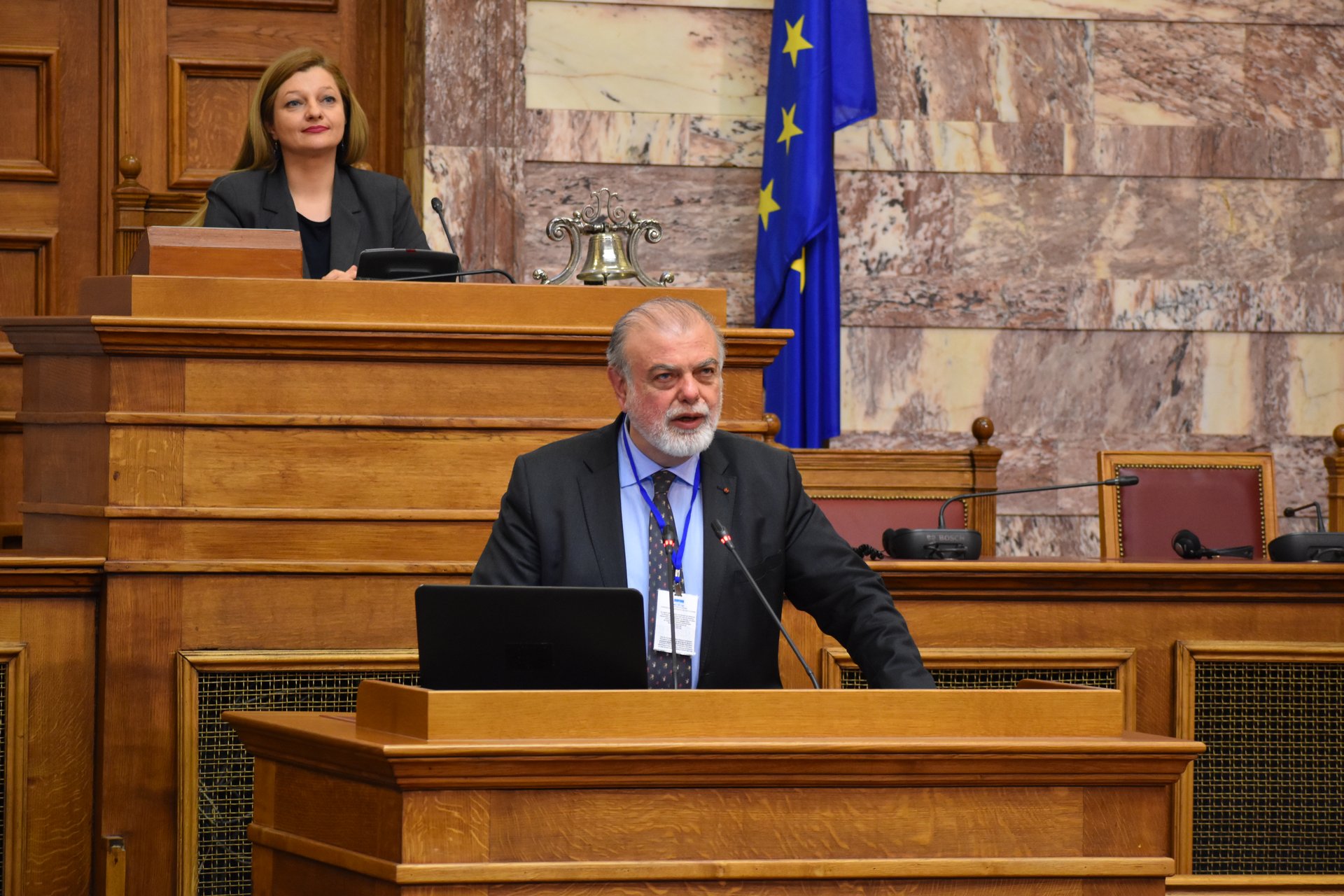 Prof. Michael Scoullos, GWP-Med Chair, and Dr. Dionysia Avgerinopoulou, Chair of the Special Permanent Parliamentary Committee on Environmental Protection.
Prof. Michael Scoullos, GWP-Med Chair, and Dr. Dionysia Avgerinopoulou, Chair of the Special Permanent Parliamentary Committee on Environmental Protection.
GWP-Med Chair Prof. Michael Scoullos also addressed Parliamentarians, providing an analysis of a broader set of socio-economic indicators as well as of water resources challenges in the Mediterranean and Greece and how they impact water security. He focused on a number of methodological tools offered by GWP, including the Water-Energy-Food-Ecosystems Nexus as well as the Source-to-Sea approaches, aiming to bring together, and find the optimal balance and trade-offs between, all water users towards applied solutions. These, as Prof. Scoullos emphasized, can help transform a situation of ‘zero-sum’ antagonistic water demands, into collaborative solutions that maximise water security for all.
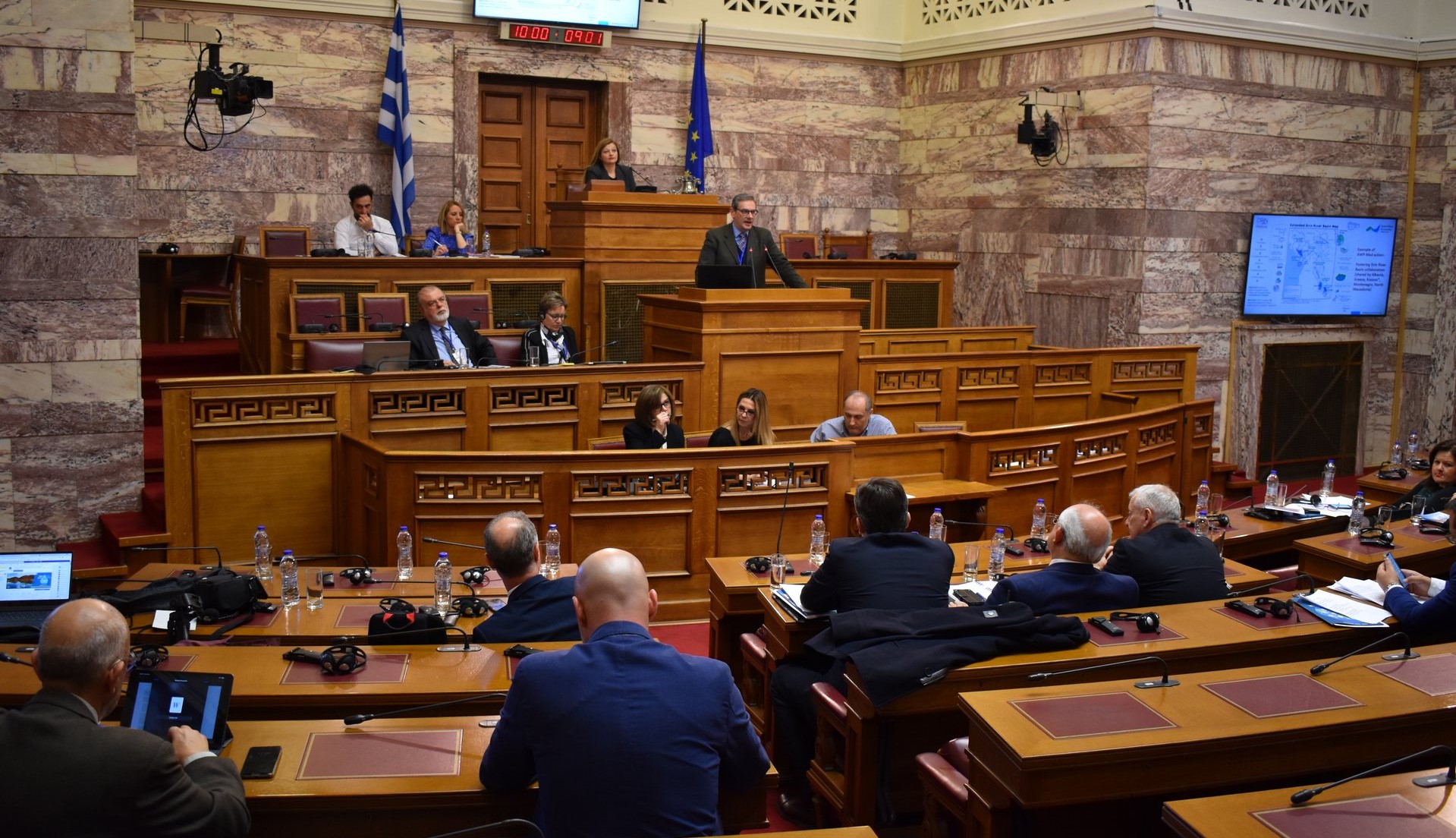
In his presentation, GWP-Med Executive Secretary Vangelis Constantianos emphasized the added value of the multi-stakeholder partnership approach. He pointed to regional political processes and cross-country cooperation mechanisms that provide key references to and are technically served by GWP-Med actions. Among examples of GWP-Med contributions, he elaborated on the long-term partnership with UfM for the development of its Water Agenda, with UNEP/Mediterranean Action Plan with emphasis in the Mediterranean coastal zone, the multi-faceted assistance to the Drin River Basin collaboration with Global Environment Facility/UNDP support, and the regional Non-Conventional Water Resources Program which, with The Coca-Cola Foundation support, has applied model water-saving solutions in 38 islands in Greece and the wider Mediterranean. He also referred to processes assisted by GWP-Med under Greece’s political leadership for more than a decade, like the Mediterranean Component of the EU Water Initiative.
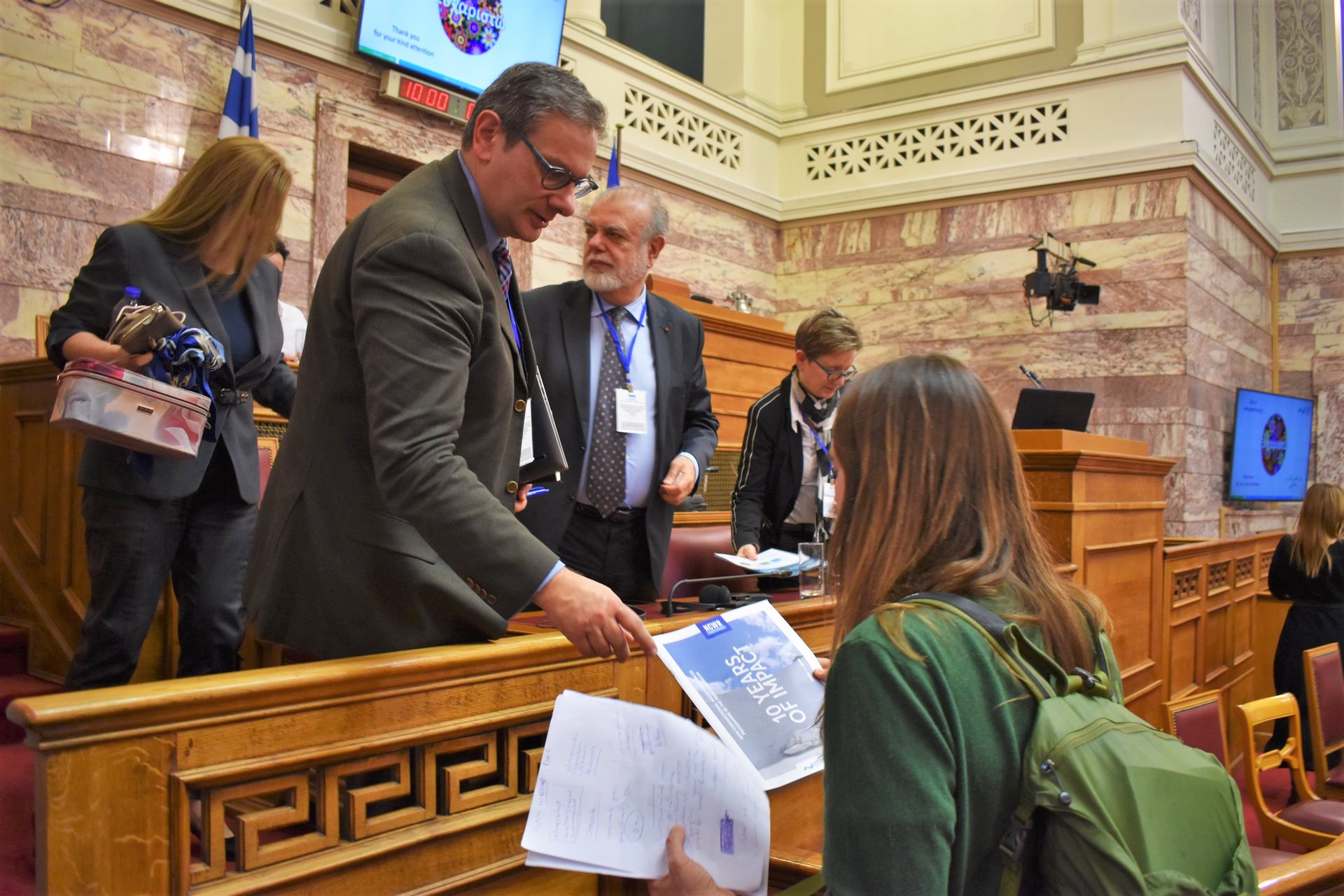 GWP-Med Executive Secretary Vangelis Constantianos shares the 10-year report of GWP-Med’s ‘Non-Conventional Water Resources’ programme with Greek parliamentarians.
GWP-Med Executive Secretary Vangelis Constantianos shares the 10-year report of GWP-Med’s ‘Non-Conventional Water Resources’ programme with Greek parliamentarians.
Dr. Weber-Fahr’s visit to Athens included further meetings with high-level representatives of public authorities, including with Prof. Konstantinos Aravossis, Secretary General for Natural Environment & Water, Ministry of Environment and Energy, with whom options were explored for collaboration of the Ministry with GWP and GWP-Med. Furthermore, working meetings took place between Dr. Weber-Fahr and the GWP-Med Chair and Secretariat.
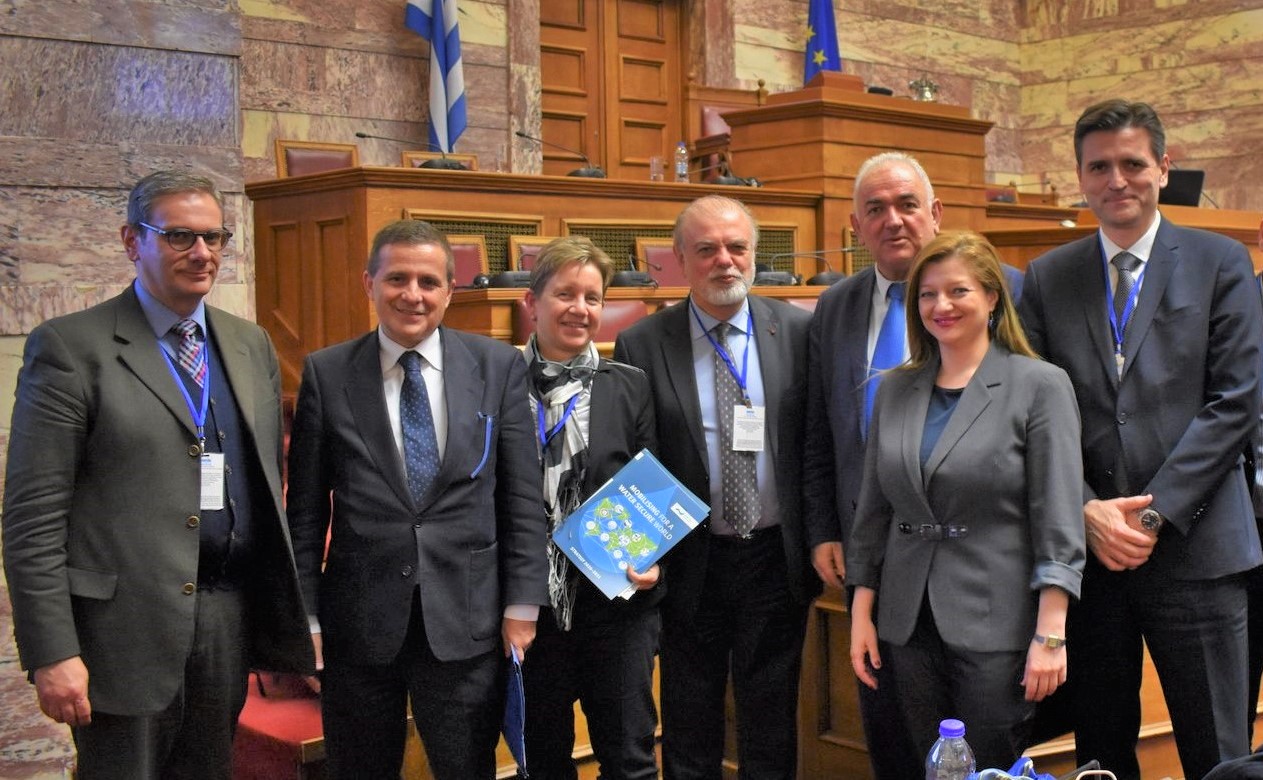 Left to right: Mr Vangelis Constantianos, GWP-Med Executive Secretary; Prof. Konstantinos Aravossis, Secretary General for Natural Environment & Water, Ministry of Environment and Energy, Hellenic Republic; Dr. Monika Weber-Fahr, GWP Executive Secretary; Prof. Michael Scoullos, GWP-Med Chairman, MP Mr. Savvas Chionidis, MP Dr. Dionysia Avgerinopoulou, Chair of the Special Permanent Parliamentary Committee on Environmental Protection; and, Mr. Anastasios Tossios, Deputy Chief Executive Officer, EYDAP S.A.
Left to right: Mr Vangelis Constantianos, GWP-Med Executive Secretary; Prof. Konstantinos Aravossis, Secretary General for Natural Environment & Water, Ministry of Environment and Energy, Hellenic Republic; Dr. Monika Weber-Fahr, GWP Executive Secretary; Prof. Michael Scoullos, GWP-Med Chairman, MP Mr. Savvas Chionidis, MP Dr. Dionysia Avgerinopoulou, Chair of the Special Permanent Parliamentary Committee on Environmental Protection; and, Mr. Anastasios Tossios, Deputy Chief Executive Officer, EYDAP S.A.
[1] COMPSUD aims to promote dialogue among Members of Parliaments from Mediterranean countries, politicians and other Stakeholders on the necessary socio-economic conditions for the sustainable development and protection of the Mediterranean environment. Since its creation in 2002, the work of COMPSUD is jointly facilitated by the Mediterranean Information Office for Environment, Culture and Sustainable Development (MIO-ECSDE) and the Global Water Partnership - Mediterranean (GWP-Med).
